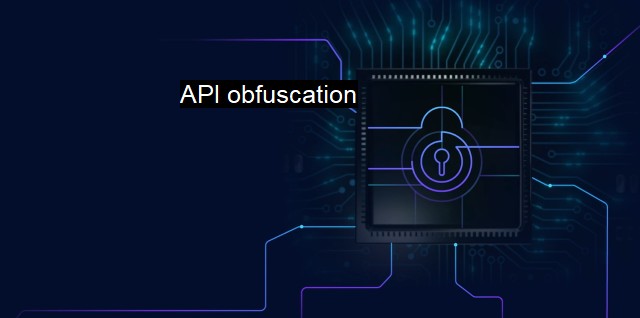What is API obfuscation?
API Obfuscation: A Powerful Technique for Safeguarding Cybersecurity and Preventing Malware Infections
API obfuscation is a technique used in cybersecurity to protect valuable data from being exploited by attackers. API or Application Programming Interface is the software intermediary that allows two applications to communicate with each other. It defines the kinds of calls or requests that a system can make, how to make them, the data formats that should be used, and the conventions to follow. API obfuscation is a valuable tactic that can be used to deter hackers from identifying, reverse engineering, or exploiting the communication between different software applications.As malicious activities become more commonplace, it is crucial for cybersecurity professionals to adopt advanced measures to protect software systems. Hackers constantly inspect API structures, methods, classes, fields, strings, and other elements that interact with the software applications. This inspection aids them in understanding how a software works and helps them find ways to manipulate the system to their advantage.
API obfuscation, therefore, becomes a significant part of protecting a system. It works by masking the integral elements of a system that lets one application interact with another application via an API. This is usually achieved by introducing confusion in coding, renaming, reordering, or otherwise falsifying data to make it harder, if not impossible, to understand. The names and paths are altered in a way that doesn't hinder the program's execution but distorts the core logic, making it tougher for an attacker to infer much about the hidden interactions. This ambiguity is enough to dissuade a majority of opportunistic hackers.
In the context of antivirus software, API obfuscation is pertinent. Such software heavily relies on APIs since they need to interact with numerous system components. Undoubtedly, knowing how an antivirus tool works would be advantageous to a hacker, and thus they would inspect the APIs that it uses. To counteract this, antivirus software would employ API obfuscation techniques to complicate the hacker's understanding of how the software interacts with system components.
API obfuscation should not be the only line of defense against hackers. Since obfuscation adds complexity to detect meaningful Bridges (APIs), some attackers may still be able to reverse-engineer the API and use it to their advantage. it is an important element in a multi-layered security strategy.
A precise API obfuscation is not about completely hiding the processing mechanism which would impair API's functionality. Instead, it creates confusion that leads to incorrect hacker assumptions about its inner workings or makes reverse-engineering too costly or time-consuming while still maintaining the software's capability.
API obfuscation may not be an unbreachable wall of cybersecurity defense, but it can significantly increase the difficulty level for potential hackers trying to compromise a system. The techniques used in API obfuscation are meant to deter and slow down attackers, giving defenders a much-needed advantage. By adding an extra layer of security to software systems, API obfuscation can prove to be a viable tool in the cybersecurity arsenal. The context of cybersecurity and antivirus highlights the importance of API obfuscation in deterring unintended users from accessing and misusing valuable information whilst facilitating authorized interaction between software applications.

API obfuscation FAQs
What is API obfuscation?
API obfuscation is a technique used to hide the functionality and behavior of an API from attackers to prevent them from easily identifying vulnerabilities or injecting malicious code. It involves modifying the API code to make it difficult to reverse engineer, analyze, and understand, while preserving its intended functionality.Why is API obfuscation important in cybersecurity?
API obfuscation is important in cybersecurity because APIs are one of the most common targets for attackers looking to exploit vulnerabilities in software applications. By obfuscating APIs, developers can prevent attackers from easily analyzing and understanding the code and behavior of the API, making it harder for them to exploit vulnerabilities or inject malware.How does API obfuscation help in antivirus protection?
API obfuscation helps in antivirus protection by making it harder for malware to evade detection by antivirus software. Malware often uses APIs to perform malicious actions on a system, and API obfuscation can make it difficult for malware to use these APIs without raising suspicion from antivirus software. By making it harder for malware to use APIs, API obfuscation can help antivirus software detect and block malicious activities more effectively.What are some common techniques used in API obfuscation?
Some common techniques used in API obfuscation include code obfuscation, API hooking, API redirection, and API wrapping. Code obfuscation involves modifying the code of the API to make it difficult to understand and analyze, while API hooking involves intercepting and redirecting API calls to different code. API redirection involves redirecting API calls to different APIs with similar functionality, while API wrapping involves encapsulating an API in a wrapper to modify its behavior or add additional layers of security.| | A | | | B | | | C | | | D | | | E | | | F | | | G | | | H | | | I | | | J | | | K | | | L | | | M | |
| | N | | | O | | | P | | | Q | | | R | | | S | | | T | | | U | | | V | | | W | | | X | | | Y | | | Z | |
| | 1 | | | 2 | | | 3 | | | 4 | | | 7 | | | 8 | | |||||||